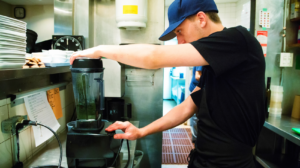Production Chef
Level 2
Yuzu Apprenticeship
For enquiries and further information, email hello@yuzutraining.co.uk or call Tel:02380 170378
-
Funding Value:
(Levy) £6,000 -
Employer 5%
(Non Levy) £300 -
EPA Cost:
(Paid by Yuzu) - Skill Level : Intermediate Course
- Certificate : NCFE

Course Level
Level 2
Category :
Hospitality
Time Duration:
12 Months

ROLE PROFILE
Production chefs work as part of a team in time-bound and often challenging kitchen environments, for example; schools, hospitals, the Armed Forces, care homes and high street casual dining or pub kitchens. They report to the Senior Production chef or appropriate line manager. Production chefs are likely to work with centrally developed standardised recipes and menus, producing food often in high volumes. They apply highly methodical organisational skills, energy, accuracy, attention to detail and are mindful of the importance of sustainability and protecting the environment.
HOW WILL I BE TRAINED?
- 12 Months of Training
- In workplace Training Delivery
- Online Training via Teams Or Zoom
- 1-2-1 Trainer Support
- Functional Skills Maths & English Support
- Observation in Workplace
- EPA Project / Portfolio of Evidence
- Knowledge Test
KNOWLEDGE
Kitchen operations
- Techniques for the preparation, assembly, cooking, regeneration and presentation of food.
- The importance of organisational/brand specifications and consistency in food production.
- How to check fresh, frozen and ambient foods are fit for purpose.
- Procedures for the safe handling and use of tools and equipment.
- The importance of following correct setting up and closing down procedures.
- Specific standards and operating procedures for organisations.
Nutrition - Key nutrient groups, their function and main food sources.
- The scope and methods of adapting dishes to meet the specific dietary, religious and allergenic needs of individuals.
Legal and governance
|
People
- How to communicate with colleagues, line managers and customers effectively.
- Principles of customer service and how individuals impact customer experience.
- How and why to support team members in own area and across organisations.
Business or Commercial
- The role of the individual in upholding organisations’ vision, values, objectives and reputation.
- The financial impact of portion and waste control
- How technology can support food production organisations.
- The importance of sustainability and working to protect the environment.
Personal Development and performance
- How personal development and performance contributes to the success of the individual, team and organisation.
- How to identify personal goals and development opportunities and the support and resources available to achieve these.
- Different learning styles.
SKILLS
Kitchen operations
- Check, prepare, assemble, cook, regenerate, hold and present food meeting the needs of the customers and maintaining organisational standards and procedures.
- Use kitchen tools and equipment correctly to produce consistently high quality dishes according to specifications.
- Take responsibility for the cleanliness, organisation and smooth running of the work area.
Nutrition
- Produce dishes to suit individuals’ specific dietary, religious and allergenic needs as required.
Legal and governance
- Operate within all regulations, legislation and procedural requirements.
- Complete and maintain documentation to meet current legislative guidelines.
People
- Use effective methods of communication with all colleagues, managers and customers to promote a positive image of yourself and the organisation.
- Work in a fair and empathetic manner to support team members while offering a quality provision.
- Work to ensure customer expectations are met.
Business or Commercial
- Work collaboratively to uphold the vision, values and objectives of the organisation.
- Use technology appropriately.
- Maintain quality and consistency in food production by using resources in line with organisations’ financial constraints, style, specifications and ethos.
Personal Development and performance
- Identify own learning style, personal development needs and opportunities and take action to meet those needs.
- Use feedback positively to improve performance.
BEHAVIOURS
- Lead by example working conscientiously and accurately at all times.
- Be diligent in safe and hygienic working practises.
- Take ownership of the impact of personal behaviours and communication by a consistent, professional approach.
- Advocate equality and respect working positively with colleagues, managers and customers.
- Actively promote self and the industry in a positive, professional manner.
- Challenge personal methods of working and actively implement improvements.

Charlotte Ndupeuchi
Yuzu Trainer
Hi, I’m Charlotte, an apprenticeship trainer at Kiwi & Yuzu Education. With experience across public, private, and third-sector organisations, I specialise in delivering bespoke 1-1 training to help individuals enhance their skills and achieve their qualifications.
Benefits for the employer
Skilled Workforce: Production chefs are integral members of kitchen teams in various environments, including schools, hospitals, care homes, and casual dining establishments. They work under the guidance of senior production chefs or line managers, contributing to the efficient production of high-volume, standardised recipes and menus. Their methodical approach and attention to detail enhance overall service quality and customer satisfaction.
Tailored Training: Production chefs benefit from targeted training that aligns with specific kitchen standards and procedures. By adhering to centrally developed recipes and learning to adapt dishes for dietary, religious, and allergenic requirements, they ensure that food preparation meets organisational goals and customer needs.
Cost-Effective Recruitment: Employing production chefs allows for the efficient handling of high-volume food production while adhering to budgetary constraints. Their ability to maintain portion control and manage food production schedules contributes to cost-effective kitchen operations and waste reduction.
Improved Retention: By committing to personal development and adhering to high standards of hygiene and food safety, production chefs contribute to a positive work environment. This dedication not only improves team morale but also supports long-term employee retention and career growth.
Professional Recognition: The professional skills and dedication of production chefs can lead to recognition within the culinary industry. Their adherence to food safety and quality standards enhances their personal career prospects and the reputation of their workplace.
Regulatory Compliance:
Production chefs are responsible for maintaining strict compliance with food safety and hygiene standards. By following production schedules and documentation requirements, they help ensure that kitchen operations meet legislative and quality standards, reducing the risk of regulatory issues.
Who is this apprenticeship for?
This apprenticeship is for individuals who aspire to become a Chef. They will be responsible for delivering high-quality products and services to their organisation’s customers.
Funding & Cost
Employers are entitled to funding from the Government to help pay for Apprenticeship training. The cost of the apprenticeship is set by Government and the cost for the Production Chef Apprenticeship is £6,000.
If you are an employer who pays the Apprenticeship Levy, the full cost of the programme can be paid through your Apprenticeship Levy.
If you are non-levy payer, the Government will pay 95% of the apprenticeship costs and you as the employer pay a 5% contribution of £300.00 at the start of the programme.
In some cases, funding via Levy Transfer can be arranged to cover the 5% contribution, if your learner is under the age of 22 you will no longer be required to contribute the 5% towards the cost of the apprenticeship.
For any questions or further information:
Email hello@yuzutraining.co.uk or call 02380 17037
Are you ready to upskill?
Enter your details below & our Apprenticeship team will be in touch!
